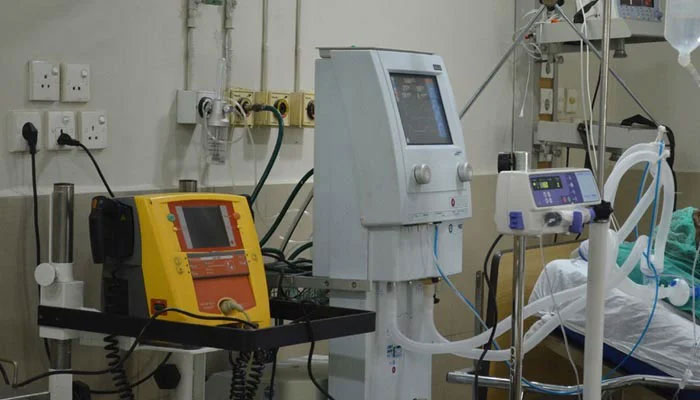Climate threats leave coastal hospitals vulnerable
Islamabad: Amid growing risks posed by climate change to Pakistan’s coastal health facilities, the federal government on Saturday announced to launch a major initiative to strengthen medical infrastructure at Karachi Port Trust Hospital, Port Qasim Medical Centre, and Gwadar Port Hospital—key maritime health centres facing outdated emergency systems, weak disease surveillance, and limited disaster preparedness.
Currently falling short of international benchmarks such as the WHO’s International Health Regulations (IHR 2005) and the Maritime Labour Convention (MLC 2006), these hospitals are ill-equipped to handle climate-driven health emergencies like oil spills, extreme weather events, or infectious disease outbreaks.
They also lack digital health records, telemedicine capabilities, and standardized infection control and quarantine protocols—gaps that severely undermine response capabilities in high-risk port zones.
Recognising these urgent challenges, Federal Minister for Maritime Affairs, Muhammad Junaid Anwar Chaudhry, announced the launch of a climate-resilient transformation of maritime healthcare infrastructure during a high-level meeting in Islamabad.
The initiative begins with a nationwide baseline assessment of healthcare facilities at the country’s major ports to integrate climate adaptation measures across the system. The minister directed that immediate steps be taken to reduce greenhouse gas emissions, minimize contamination risks, and build healthcare systems resilient to climate shocks.
“The health and resilience of our maritime workforce are vital to sustaining trade and national growth amid climate challenges. Strengthening health systems is essential not only as a moral duty but as a foundation for economic and environmental resilience,” he said.
The first phase of this initiative will focus on targeted upgrades at KPT, Port Qasim, and Gwadar hospitals, addressing critical deficiencies in trauma care, mental health support, and outbreak preparedness. Special attention will be given to maternal and child health, occupational disease surveillance for port workers, and gender-sensitive infrastructure.
Junaid Chaudhry also announced the development of a comprehensive digital health roadmap aimed at enhancing emergency preparedness for climate-induced disasters, ensuring equitable healthcare access for vulnerable port communities, and integrating real-time data with provincial health departments for coordinated responses.
The plan includes expanding mental health support systems and introducing stress management programs for maritime laborers facing climate-related psychological stress. A dedicated implementation team will oversee progress, ensure transparency, and coordinate resource mobilization.
Stakeholder consultations will be held with fisherfolk unions, port worker associations, healthcare NGOs, and provincial authorities to ensure the initiative reflects on-the-ground realities and community-specific vulnerabilities.
Estimates suggest that the three key hospitals combined receive 2,000 to 3,000 patient visits daily, underscoring the urgent need for robust, climate-adaptive healthcare systems to serve Pakistan’s maritime and port populations.
-
 Princess Eugenie Breaks Cover Amid Explosive Family Scandal
Princess Eugenie Breaks Cover Amid Explosive Family Scandal -
 Will Kate And Anthony Have 'Bridgerton' Spin Off? Revealed
Will Kate And Anthony Have 'Bridgerton' Spin Off? Revealed -
 Schoolgirl Eaten Alive By Pigs After Brutal Assault By Farmworker
Schoolgirl Eaten Alive By Pigs After Brutal Assault By Farmworker -
 King Charles’ Statement About Epstein Carries A Secret Meaning: Here’s Why It Can Be An Invite To Police
King Charles’ Statement About Epstein Carries A Secret Meaning: Here’s Why It Can Be An Invite To Police -
 Demi Lovato Delivers Heartbreaking Message To Fans About Her Concerts
Demi Lovato Delivers Heartbreaking Message To Fans About Her Concerts -
 Sweden's Princess Sofia Explains Why She Was Named In Epstein Files
Sweden's Princess Sofia Explains Why She Was Named In Epstein Files -
 Activist Shocks Fellow Conservatives: 'Bad Bunny Is Winner'
Activist Shocks Fellow Conservatives: 'Bad Bunny Is Winner' -
 Noel Gallagher Challenges Critics Of Award Win To Face Him In Person
Noel Gallagher Challenges Critics Of Award Win To Face Him In Person -
 Minnesota Man Charged After $350m IRS Tax Scam Exposed
Minnesota Man Charged After $350m IRS Tax Scam Exposed -
 Meghan Markle 'terrified' Over Possible UK Return
Meghan Markle 'terrified' Over Possible UK Return -
 Did Opiate Restrictions Lead To Blake Garrett's Death?
Did Opiate Restrictions Lead To Blake Garrett's Death? -
 Royal Expert Reflects On Princess Eugenie, Beatrice 'priorities' Amid Strained Relationship With Sarah, Andrew
Royal Expert Reflects On Princess Eugenie, Beatrice 'priorities' Amid Strained Relationship With Sarah, Andrew -
 Prince William's 'concerning' Statement About Andrew Is Not Enough?
Prince William's 'concerning' Statement About Andrew Is Not Enough? -
 50 Cent Gets Called Out Over Using Slur For Cardi B
50 Cent Gets Called Out Over Using Slur For Cardi B -
 Scientists Discover Rare Form Of 'magnets' That Might Surprise You
Scientists Discover Rare Form Of 'magnets' That Might Surprise You -
 Nancy Guthrie’s Kidnapper Will Be Caught Soon: Here’s Why
Nancy Guthrie’s Kidnapper Will Be Caught Soon: Here’s Why




